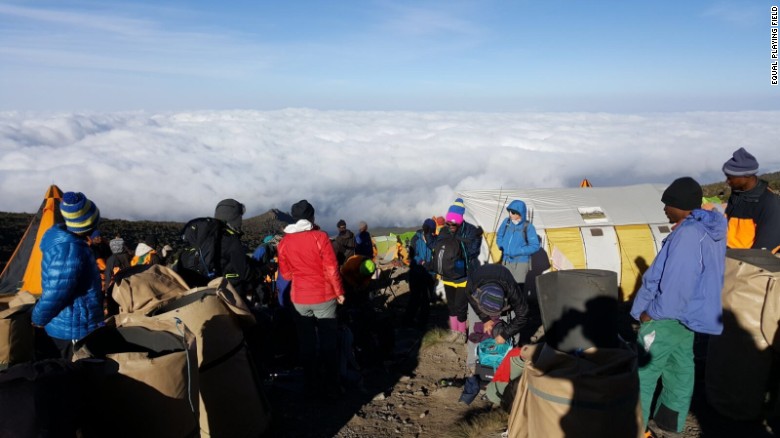Having
climbed up Africa's highest mountain, taking goal posts and nets in
tow, a group of fearless women have achieved what many thought
impossible and played a 90-minute football match on Mount Kilimanjaro.
The
squad of 30 footballers representing 20 nationalities, who included
retired US international Lori Lindsey and former England midfielder
Rachel Unitt, completed a 11-a-side match at nearly 19,000 feet, an
altitude never attempted before.
Using flour to mark the
pitch and trekking poles as corner flags, the women -- ranging in ages,
from 18 to 66 years old -- played in punishing conditions on a volcanic
ash pitch.
The game -- between
Volcano FC and Glacier FC -- ended goalless, but the result was
inconsequential as the sole purpose of the challenge was to highlight
the inequality women face in sport.
American
defender Erin Blankenship, co-founder of event organizers Equal Playing
Fields, said: "You can't challenge the fact that you've got a group of
athletes who are playing at almost 19,000ft. It doesn't matter what
gender they are."
'Needing oxygen'
Olympic
champion Lindsey, who played for USA at the 2011 World Cup and 2012
London Olympics, was one of the star players taking part. She was keen
to raise awareness of the issues women and girls face when playing
sport.
"I'm fortunate enough to
have had pioneers who came before me, but it's our responsibility to
continue to make strides forward for the generations to come," she told
CNN Sport before embarking on the trip.
Playing in thin air, which causes a reduction in physical performance, isn't easy.
In
May 2007, FIFA -- football's world governing body -- introduced a
temporary ban, revoked a year later, on international matches at more
than 8,200ft above sea level, citing concerns about players' health and
the "unfair" advantage to acclimatized home teams.
Earlier
in 2007, Brazilian club Flamengo had said it would boycott
high-altitude games after a match at 12,467 ft -- against Bolivia's Real
Potosi -- left some team members needing oxygen.
"We made a pact before the game that it was all about the game finishing," said Glacier FC coach Dawn Scott.
"It
was equal opportunities and we termed the substitutes coming on as
record makers as they'd be the ones pushing us on because you could see
players dropping and needing oxygen towards the end."
The fight for equality in women's sport
Throughout
history sportswomen have had to climb metaphorical mountains and
organizers Equal Playing Field say the fight is ongoing, which is why
they dreamed up this record-breaking mission.
This year alone, the debate over equality has made headlines.
Earlier
this month it was revealed that Serena Williams, the most successful
female tennis player in the Open era, was the only woman in Forbes'
latest list of the world's top 100 highest-paid athletes.
The 35-year-old American is ranked 51st,
with total earnings of $27 million last year -- $37m less than Roger
Federer, the most successful men's tennis player in history, who is
fourth on the list.
In April, the
US women's national soccer team ended a long-running dispute over pay
and conditions by agreeing a new deal with US Soccer, the country's
governing body.
That was not the only case this year of international sportswomen taking a stand.
Also
in April, the Republic of Ireland women's football team threatened to
go on strike. Players' representative, Stuart Gilhooly, said they were
being treated like "fifth-class citizens" by the Football Association of
Ireland.
Meanwhile US women's
hockey threatened to boycott the world championships before agreeing a
pay deal just three days before the start of the tournament.
Equal
Playing Field had said it wanted to "challenge the social norms for
girls and women in sport" and acknowledge "the systematic, structured
inequality that girls and women face in most aspects of their lives."
What
will their next challenge be? There are whispers that they may attempt
to play a football match in the lowest altitude ever recorded, near the
Dead Sea in Jordan.





0 Comments